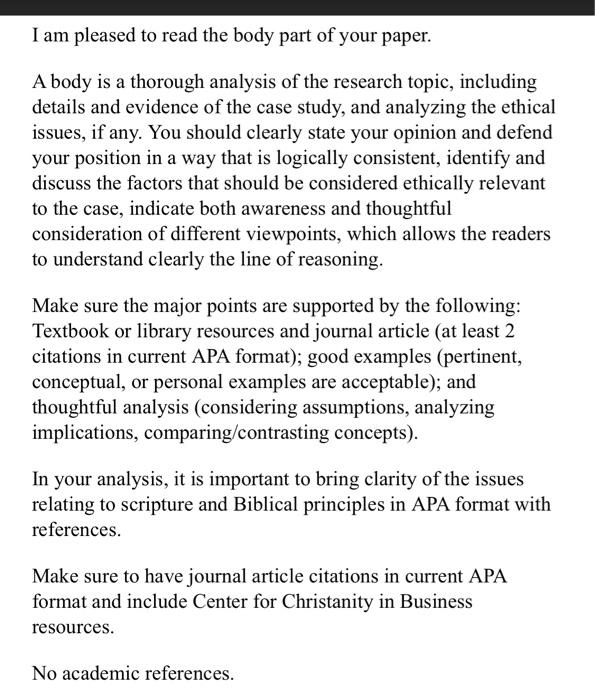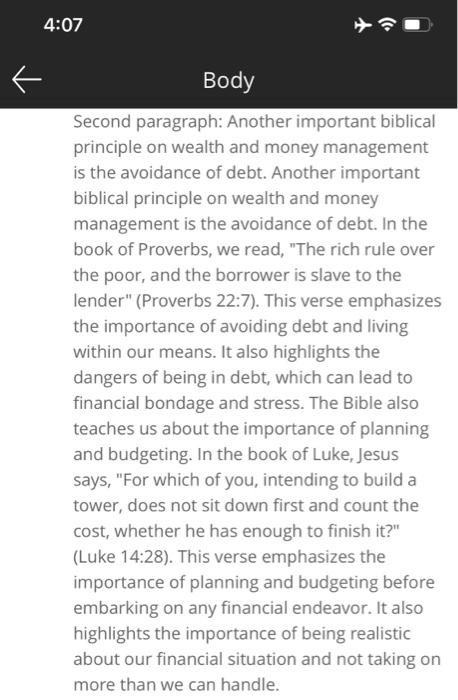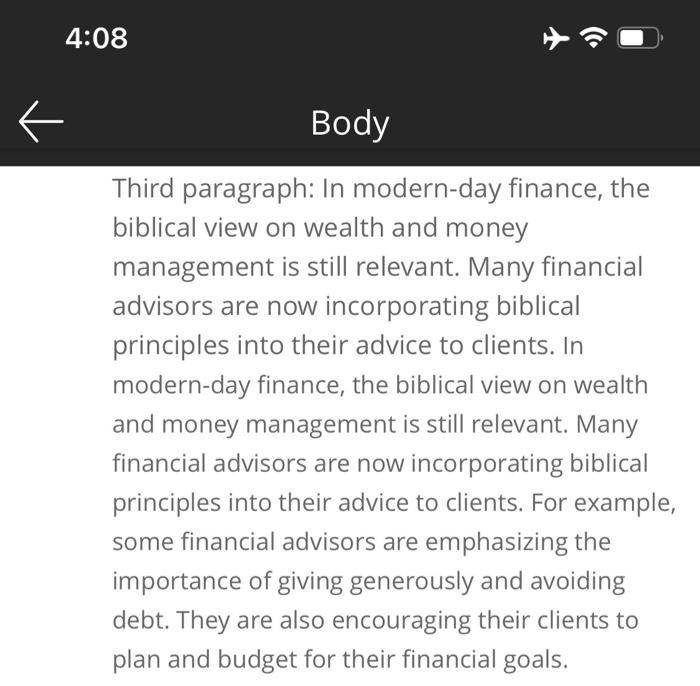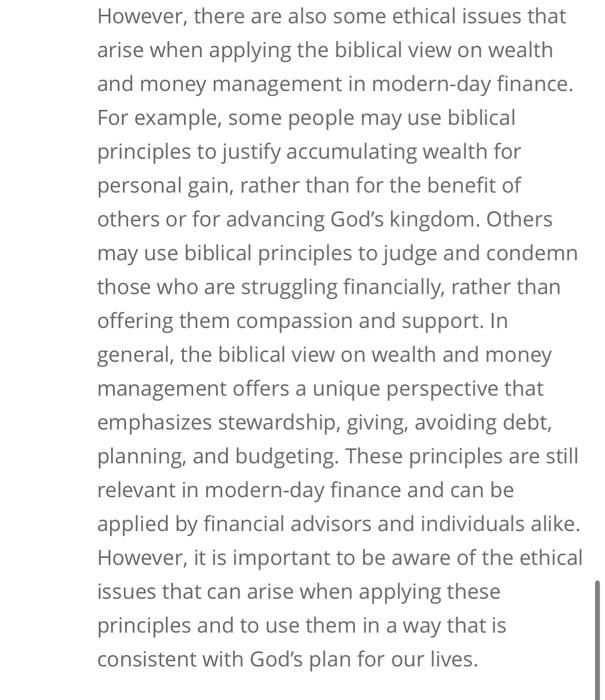Answered step by step
Verified Expert Solution
Question
1 Approved Answer
I need help to modify my text, modification needed are cited in the First Picture, the pictures that follows is the Text. I am pleased
I need help to modify my text, modification needed are cited in the First Picture, the pictures that follows is the Text. 





I am pleased to read the body part of your paper. A body is a thorough analysis of the research topic, including details and evidence of the case study, and analyzing the ethical issues, if any. You should clearly state your opinion and defend your position in a way that is logically consistent, identify and discuss the factors that should be considered ethically relevant to the case, indicate both awareness and thoughtful consideration of different viewpoints, which allows the readers to understand clearly the line of reasoning. Make sure the major points are supported by the following: Textbook or library resources and journal article (at least 2 citations in current APA format); good examples (pertinent, conceptual, or personal examples are acceptable); and thoughtful analysis (considering assumptions, analyzing implications, comparing/contrasting concepts). In your analysis, it is important to bring clarity of the issues relating to scripture and Biblical principles in APA format with references. Make sure to have journal article citations in current APA format and include Center for Christanity in Business resources. No academic references. Frist paragraph: The biblical view on wealth and money management in modern-day finance is a topic that has gained a lot of attention in recent times. Many people have turned to the Bible for guidance on how to manage their finances and accumulate wealth. In this article, we will explore the biblical perspective on wealth and money management and its relevance in modern-day finance. The Bible offers a unique perspective on wealth and money management, which is based on the principle of stewardship. According to this principle, God is the owner of all things, and we are merely stewards or caretakers of His possessions. This means that we have a responsibility to manage our resources in a way that is consistent with God's plan for our lives. This includes using our resources to help others and to advance God's kingdom on earth. One of the key teachings of the Bible on wealth and money management is the importance of giving. In the book of Malachi, God challenges His people to test Him in the area of giving. He says, "Bring the whole tithe into the storehouse, that there may be food in my house. Test me in this," says the Lord Almighty, "and see if I will not throw open the floodgates of heaven and pour out so much blessing that there will not be room enough to store it" (Malachi 3:10). This verse highlights the importance of giving generously and trusting God to provide for our needs. Second paragraph: Another important biblical principle on wealth and money management is the avoidance of debt. Another important biblical principle on wealth and money management is the avoidance of debt. In the book of Proverbs, we read, "The rich rule over the poor, and the borrower is slave to the lender" (Proverbs 22:7). This verse emphasizes the importance of avoiding debt and living within our means. It also highlights the dangers of being in debt, which can lead to financial bondage and stress. The Bible also teaches us about the importance of planning and budgeting. In the book of Luke, Jesus says, "For which of you, intending to build a tower, does not sit down first and count the cost, whether he has enough to finish it?" (Luke 14:28). This verse emphasizes the importance of planning and budgeting before embarking on any financial endeavor. It also highlights the importance of being realistic about our financial situation and not taking on more than we can handle. Third paragraph: In modern-day finance, the biblical view on wealth and money management is still relevant. Many financial advisors are now incorporating biblical principles into their advice to clients. In modern-day finance, the biblical view on wealth and money management is still relevant. Many financial advisors are now incorporating biblical principles into their advice to clients. For example, some financial advisors are emphasizing the importance of giving generously and avoiding debt. They are also encouraging their clients to plan and budget for their financial goals. However, there are also some ethical issues that arise when applying the biblical view on wealth and money management in modern-day finance. For example, some people may use biblical principles to justify accumulating wealth for personal gain, rather than for the benefit of others or for advancing God's kingdom. Others may use biblical principles to judge and condemn those who are struggling financially, rather than offering them compassion and support. In general, the biblical view on wealth and money management offers a unique perspective that emphasizes stewardship, giving, avoiding debt, planning, and budgeting. These principles are still relevant in modern-day finance and can be applied by financial advisors and individuals alike. However, it is important to be aware of the ethical issues that can arise when applying these principles and to use them in a way that is consistent with God's plan for our lives 





Step by Step Solution
There are 3 Steps involved in it
Step: 1

Get Instant Access to Expert-Tailored Solutions
See step-by-step solutions with expert insights and AI powered tools for academic success
Step: 2

Step: 3

Ace Your Homework with AI
Get the answers you need in no time with our AI-driven, step-by-step assistance
Get Started


